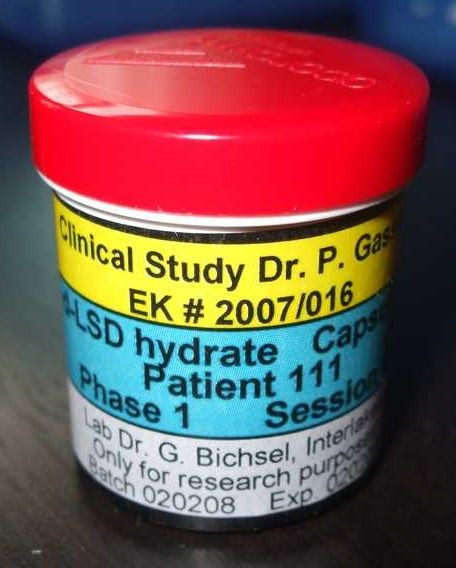LSD Could Improve Your Mental Health: Researchers Find 'Lasting Beneficial Effects From Using Psychedelics'

In Native American ceremonies, the hallucinogenic substance peyote has been used sacramentally, and in the early 1960s, LSD (lysergic acid diethylamide, also known as ‘acid’) was administered by healthcare professionals to many patients, including the actor Cary Grant, for therapeutic purposes. Yet, hallucinogenic substances have also garnered a negative reputation among those who fear or dislike 'street' use of these drugs.
After analyzing data from a U.S. national health survey, Teri Krebs and Pål-Ørjan Johansen, researchers at the Norwegian University of Science and Technology (NTNU) Department of Neuroscience, have determined that use of LSD, magic mushrooms, or peyote does not increase a person's risk of developing mental health problems.
In fact, the researchers found that ‘lifetime use’ of LSD may be associated with less psychiatric medicine prescriptions and lower frequency of outpatient treatment for issues of mental health.
Controversy
When hallucinogenic substances are used recreationally, overdose does not seem to occur (or be recorded) as frequently as it does with other drugs. Certainly, though, in at least one instance involving LSD, overindulgence has been considered ‘life-threatening.’ In that case, as documented in the Western Journal of Medicine, eight people accidentally ingested an abnormally high dosage of LSD and suffered, among other symptoms, bleeding, vomiting, and physical collapse. Admitted to San Francisco General Hospital, they were successfully treated and eventually released within days.
Yet, the Drug Policy Alliance states, “Experts agree that psychedelics do not cause addiction or compulsive use, and they are not known to harm the brain.” While the National Institue on Drug Abuse agrees that LSD is not addictive, it notes that certain small studies of the drug have shown it can produce flashbacks in users and even cause impairment.
Yet, a 2012 study by Krebs and Johansen found evidence of beneficial effects; in fact, they discovered that use of LSD, when administered to patients being treated for alcoholism, proved helpful. Patients given a dose of LSD were less likely to relapse into misusing alcohol. Having completed a study on one specific aspect of LSD's effects, Krebs and Johansen next decided to investigate the existence — or non-existence — of a link between LSD use and mental health problems.
A Positive For Mental Health?
For this recent study, the NTNU researchers explored data from the 2001-2004 National Survey on Drug Use and Health, which tracked information on the prevalence, patterns, and consequences of alcohol, tobacco, and illegal drug use and abuse in the general U.S. civilian non-institutionalized population. Participants aged 12 and older were asked, among other questions, about mental health treatment as well as symptoms of mental health conditions over the past year.
After examining information from 130,000 randomly chosen people, Krebs and Johansen noted the incidence of general psychological distress, anxiety disorders, mood disorders, and psychosis in both users and non-users of psychedelic drugs.
"After adjusting for other risk factors, lifetime use of LSD, psilocybin, mescaline or peyote, or past year use of LSD was not associated with a higher rate of mental health problems or receiving mental health treatment," stated Johansen in a press release.
In fact, the researchers found that lifetime use of psilocybin or mescaline and past-year use of LSD might be linked to lower rates of serious psychological distress. Lifetime use of LSD was linked to fewer psychiatric medicine prescriptions and lower frequency of outpatient treatment for issues of mental health.
“Early speculation that psychedelics might lead to mental health problems was based on a small number of case reports and did not take into account either the widespread use of psychedelics or the not infrequent rate of mental health problems in the general population,” Krebs stated in a press release.
The researchers, though, did note that even if use of psychedelics might have a positive effect on mental health on a population level, individuality must be addressed. "We cannot exclude the possibility that use of psychedelics might have a negative effect on mental health for some individuals or groups," the authors stated in a press release.
Origins
Although many people believe that LSD is exclusively synthesized in a laboratory, it is a naturally occurring substance. It occurs in ergot, a type of fungus that can grow on grains like rye and wheat and, when eaten, can cause a type of poisoning that includes vomiting, hallucinations, and muscle spasms.
In 1938, while searching for a stimulant for blood circulation, Swiss chemist Albert Hoffman, who worked for Sandoz Laboratories, synthesized lysergic acid diethylanine. After various experiments, he came up with a specific formula known as ‘LSD-25.’ This formula did not prove effective so he left-off his research. Five years later, though, he decided to look at it again. Accidentally, he exposed himself to the drug and discovered its hallucinatory effects. After this, Sandoz Laboratories began research to see if the drug might have a use in psychiatric treatment.
Source: Krebs TS, Johansen PO. Lysergic acid diethylamide (LSD) for alcoholism: meta-analysis of randomized controlled trials. Journal of Psychopharmacology. 2012.
Krebs TS, Johansen PO. LSD and other psychedelics not linked with mental health problems. PLOS ONE. 2013.



























